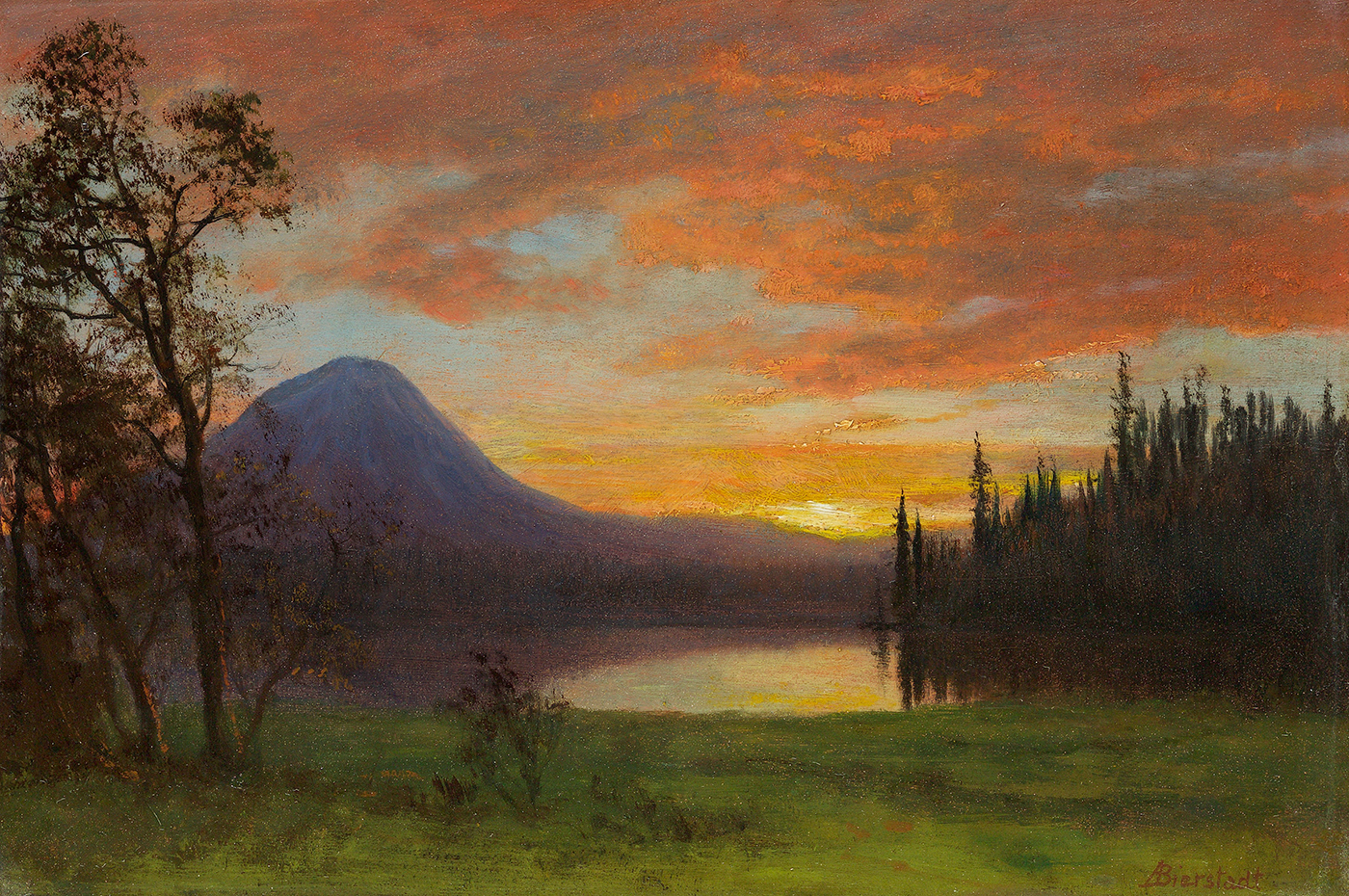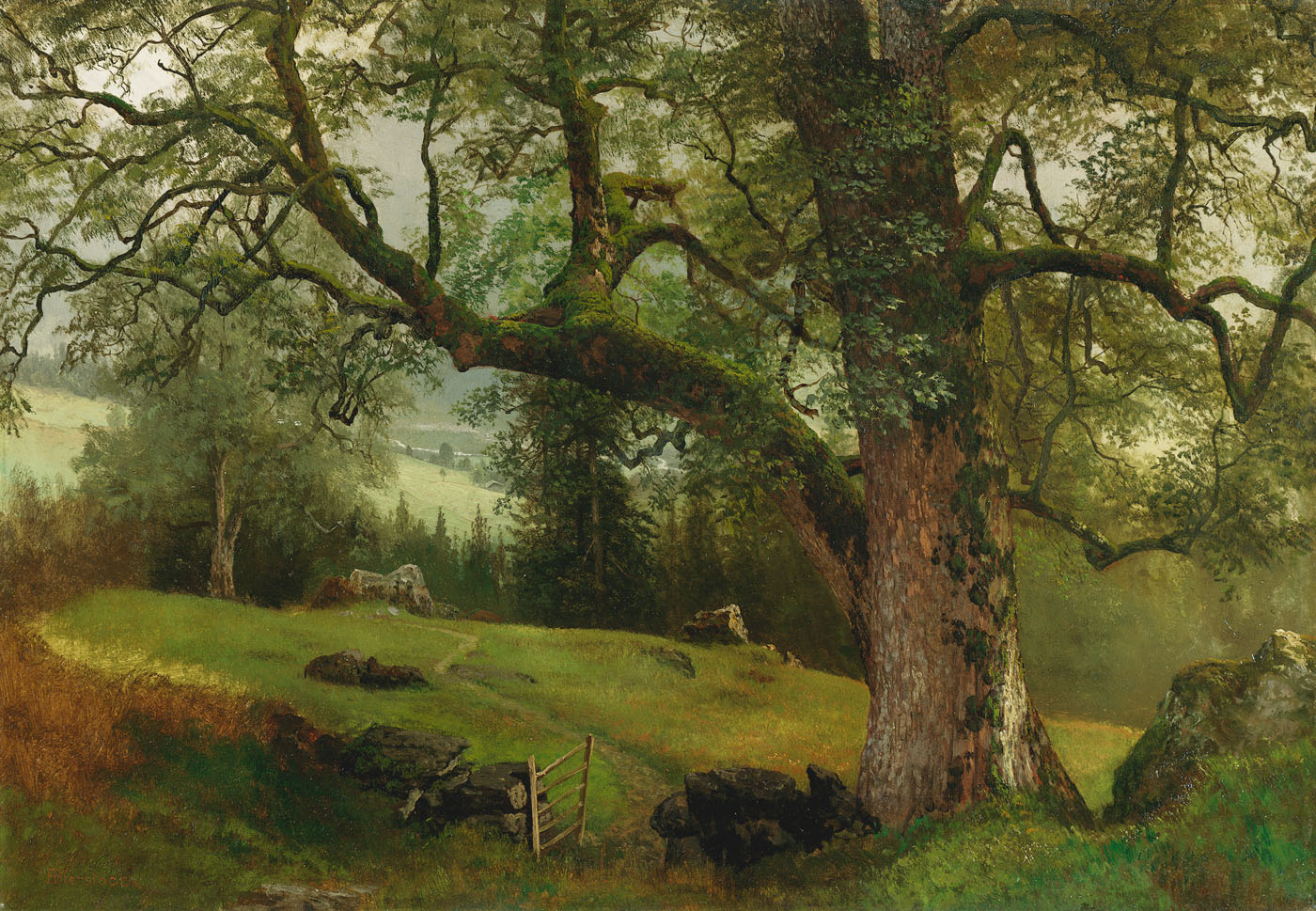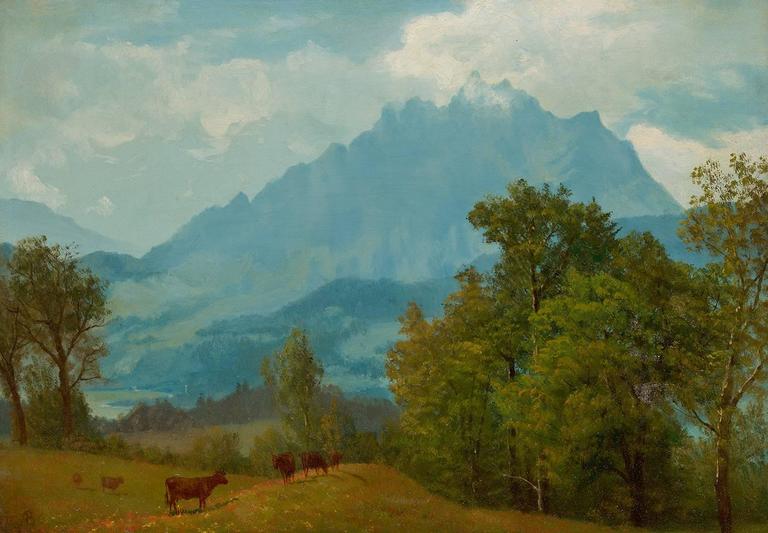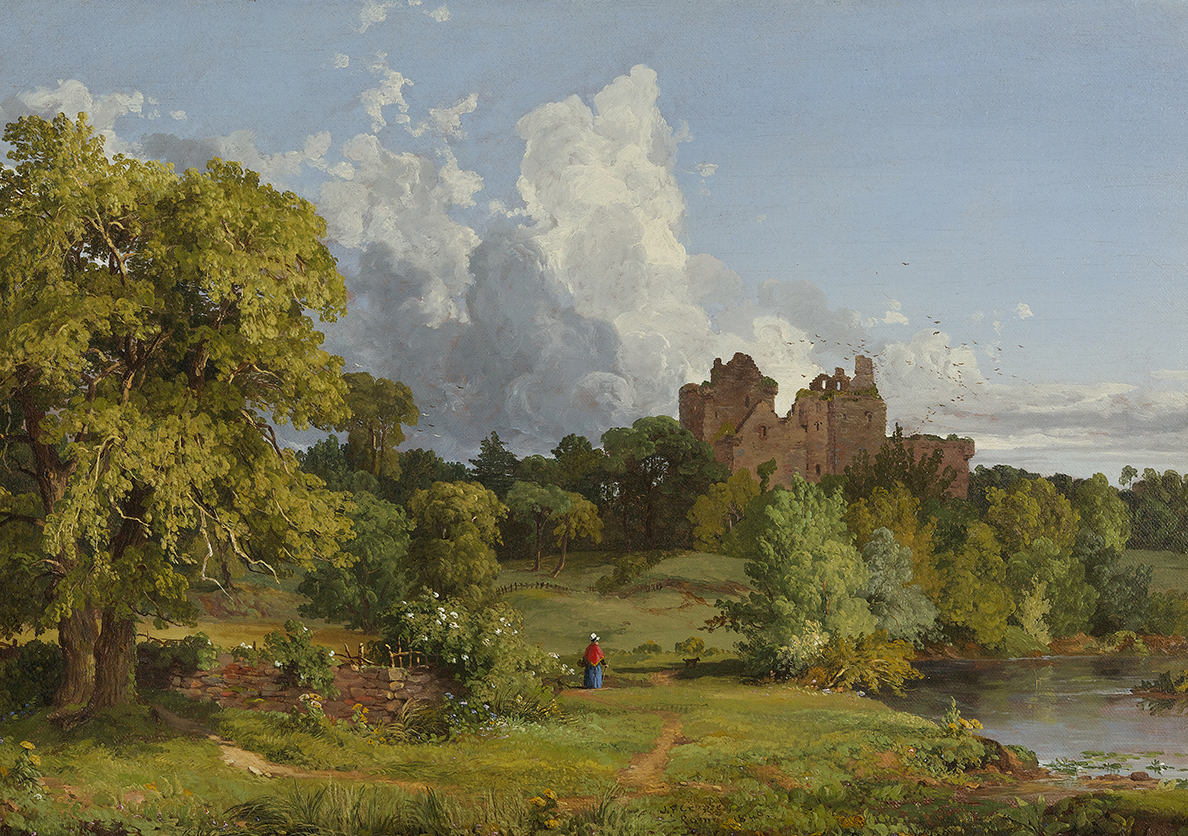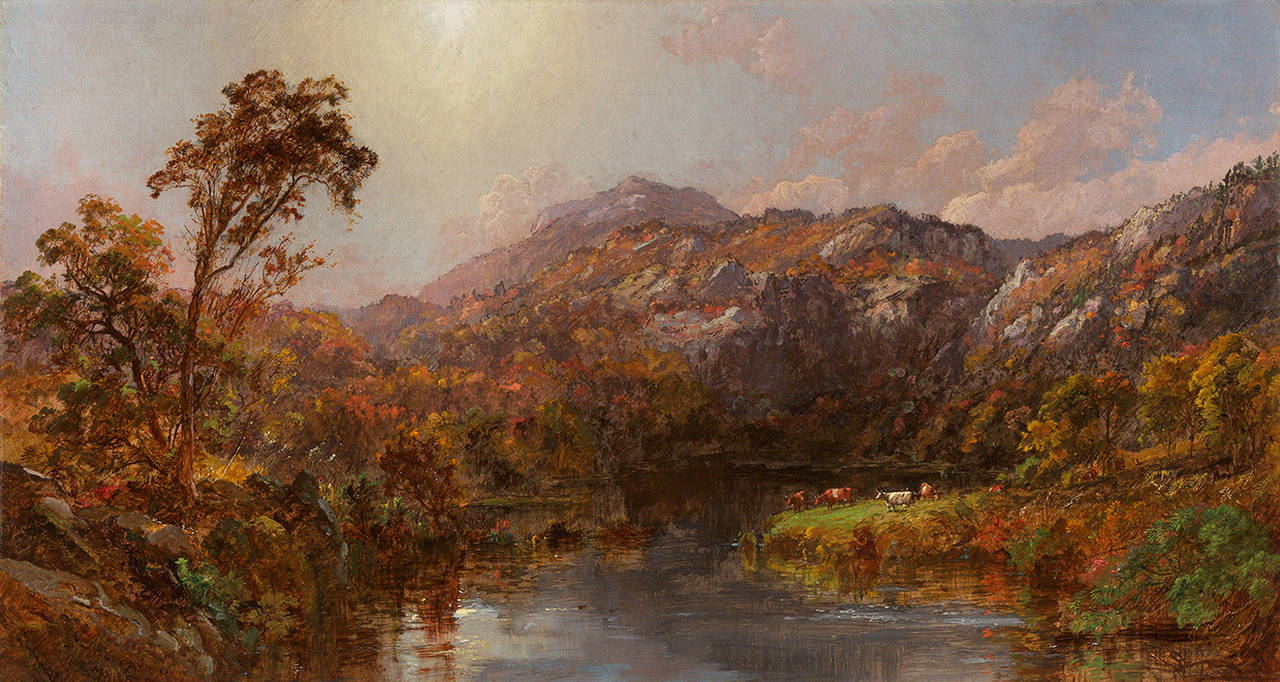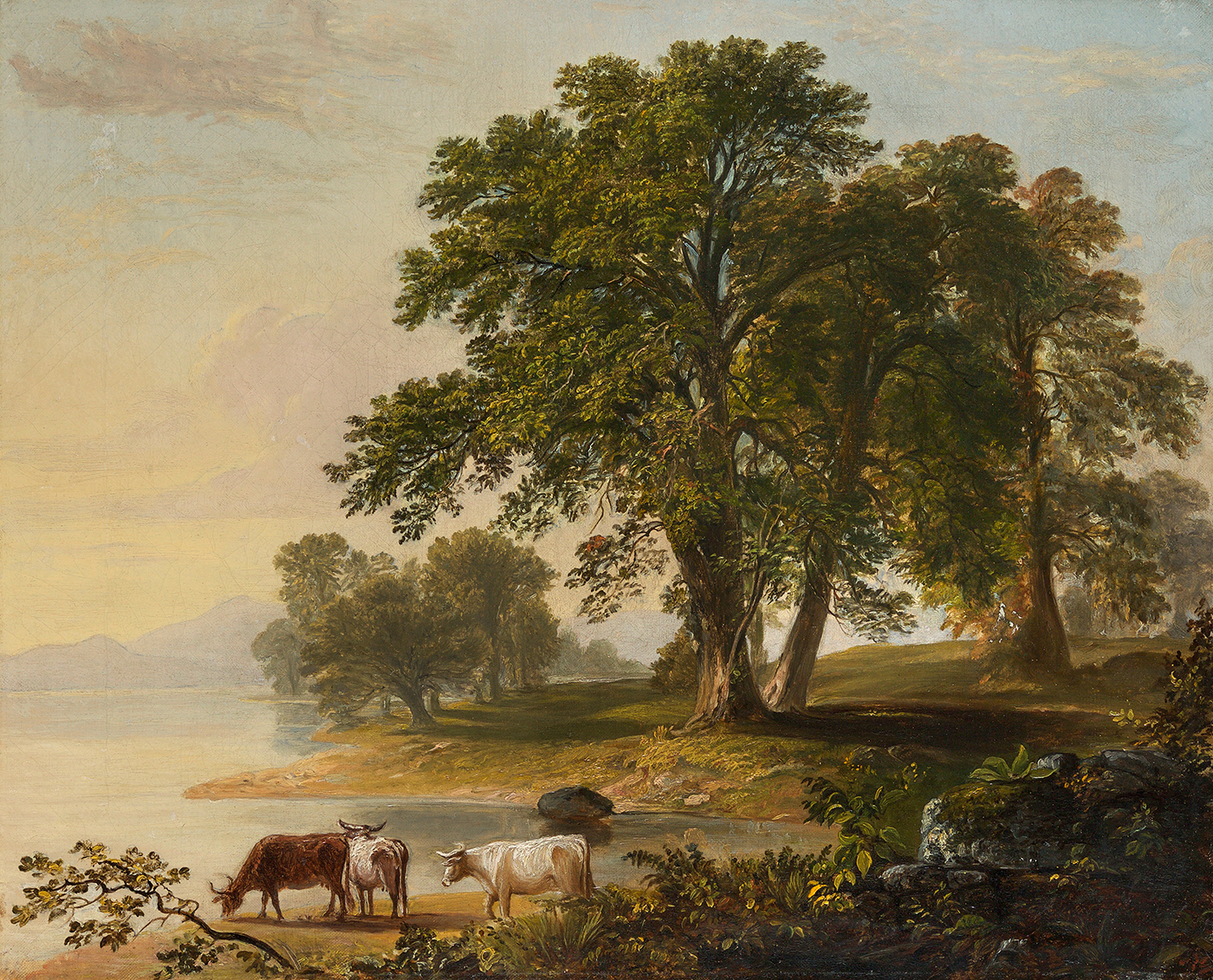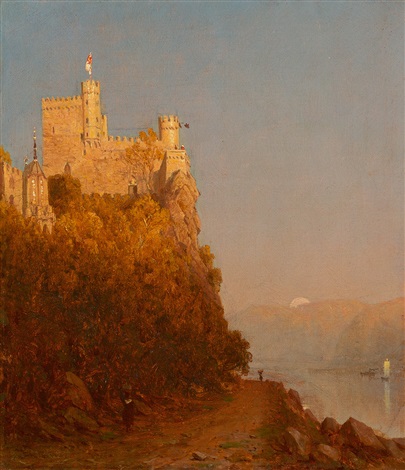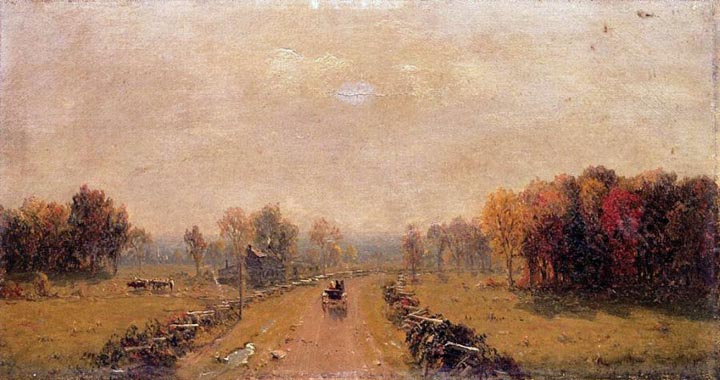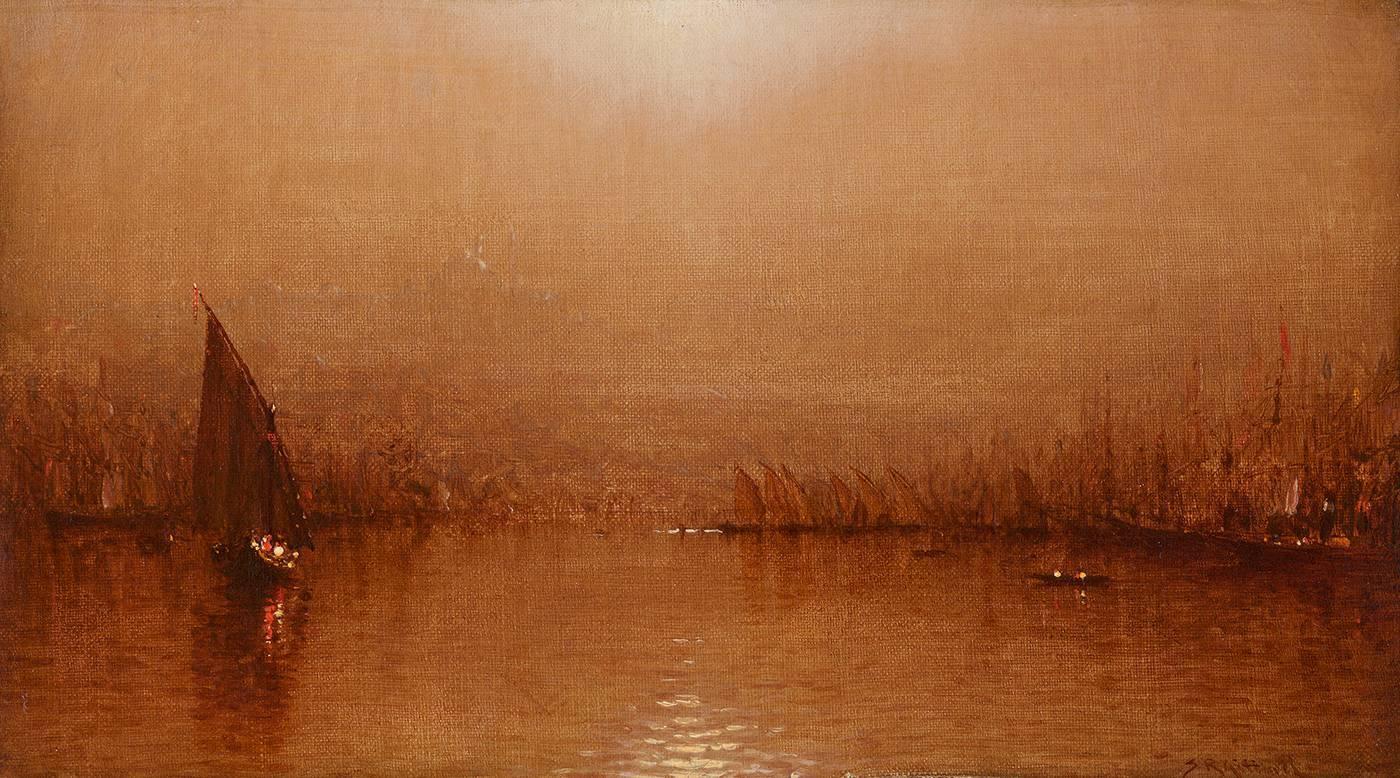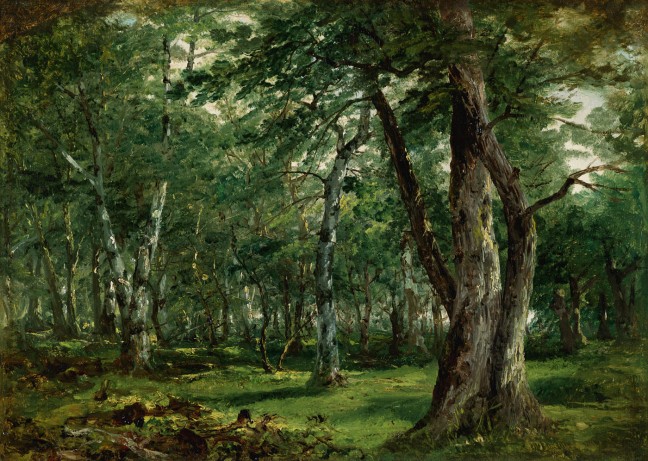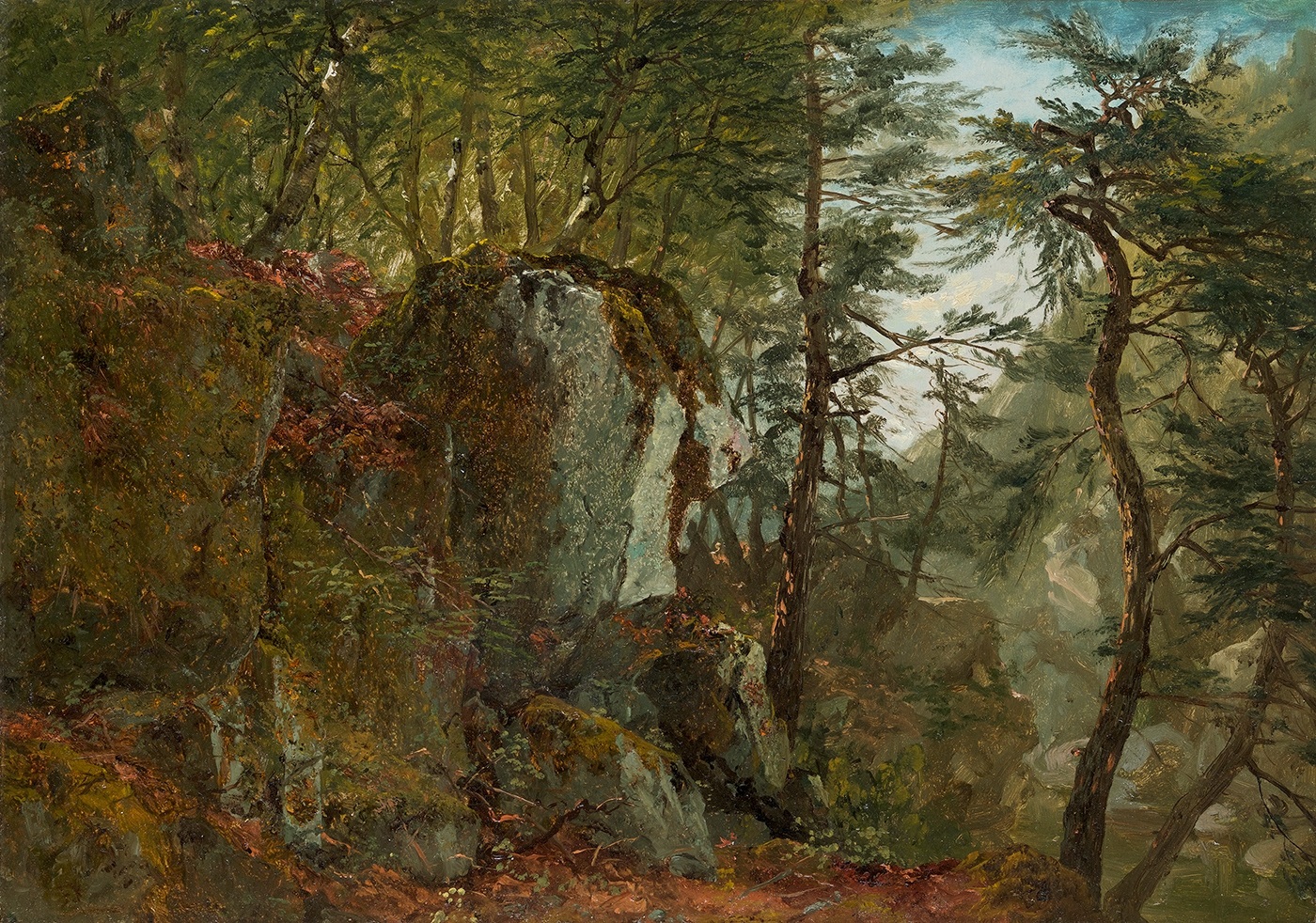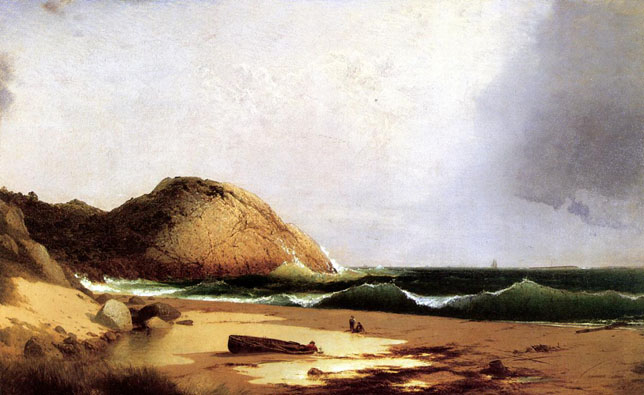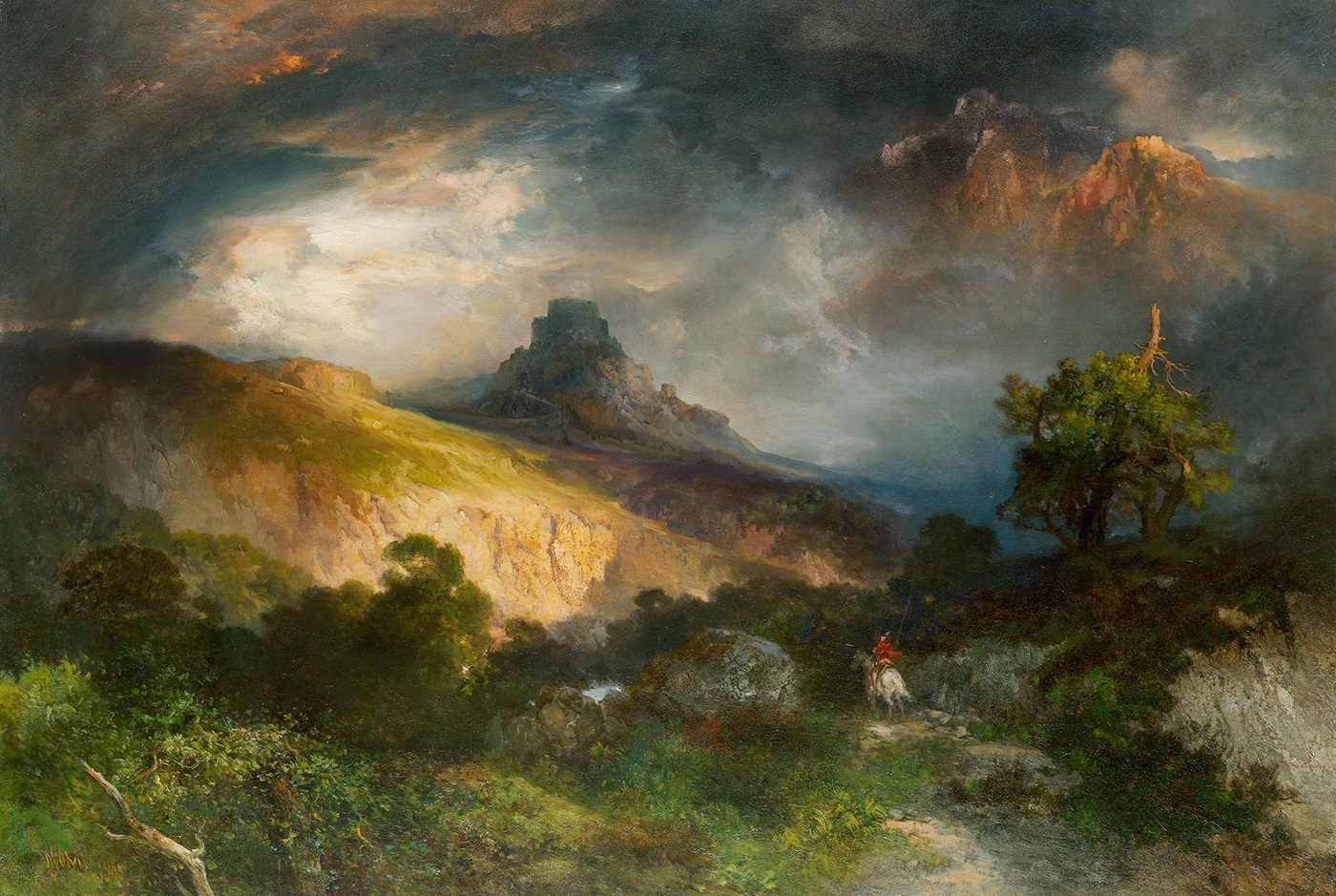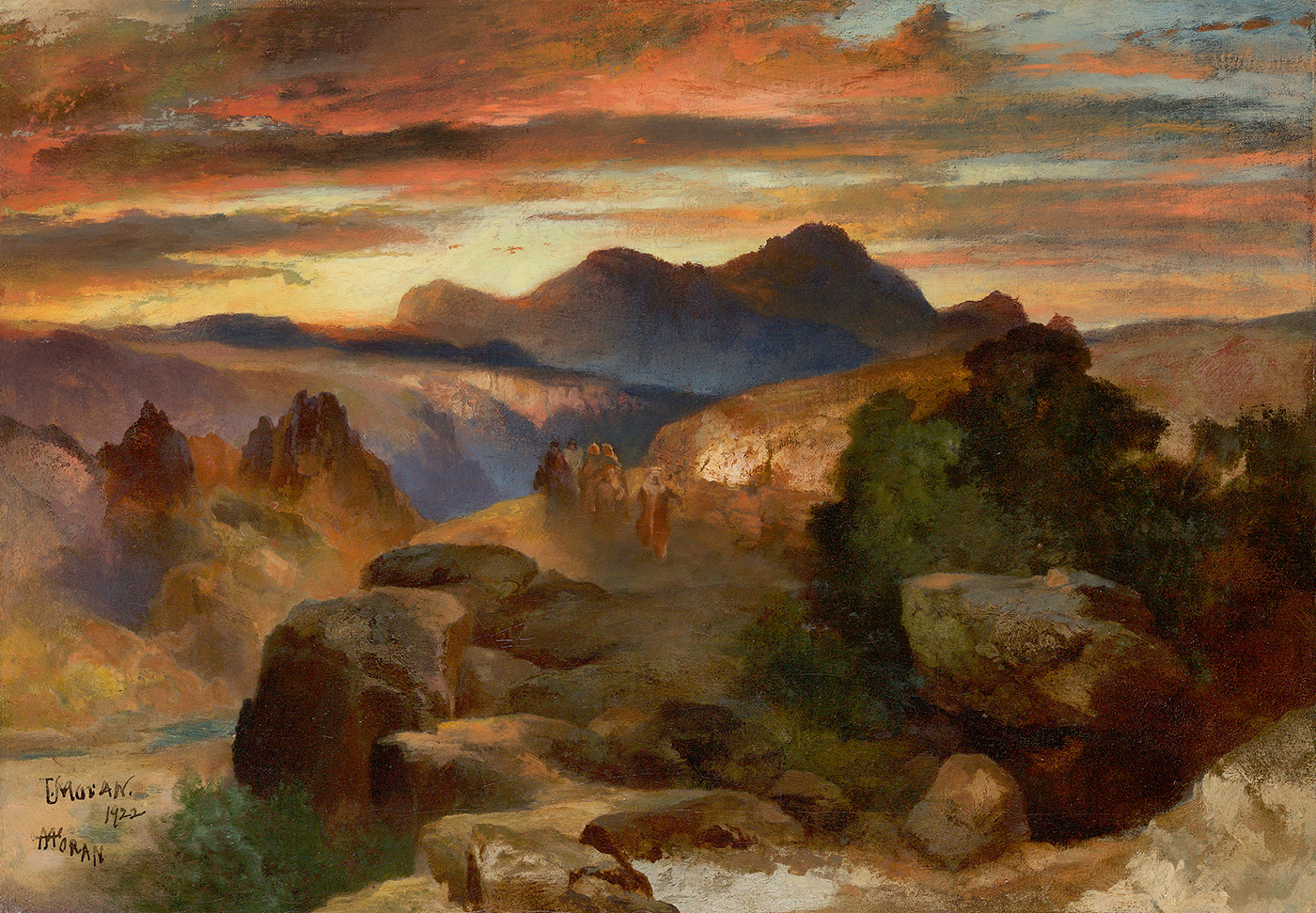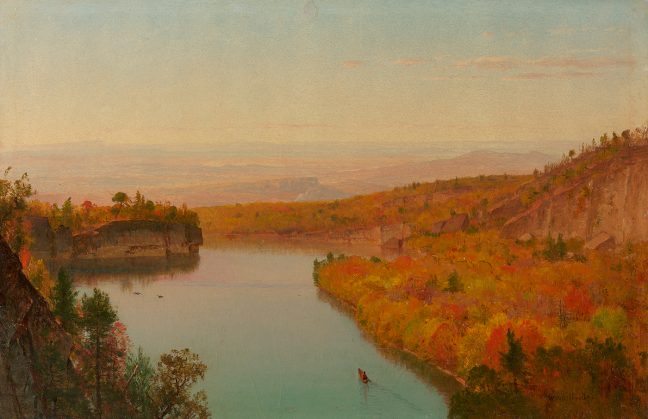Questroyal Fine Art
March 10 - April 8, 2017
This spring, Questroyal Fine Art offers American art lovers the rare opportunity to view an exceptional, comprehensive exhibition of Hudson River School paintings. Over 125 works by leaders of the movement will be on view at 903 Park Avenue from March 10 through April 8 in Worthy of the Ages: Important Hudson River School Paintings. Although less prominent in today’s headlines than some later movements, the Hudson River School has endured as the foundation of American landscape painting and is at the core of some of the most important collections, including the Metropolitan Museum of Art, Smithsonian American Art Museum, and the White House.
Painters who strove to define American art in the nineteenth century and found inspiration in the unique landscapes of their developing nation will be displayed in Questroyal’s expansive galleries. Included are multiple examples by masters such as Albert Bierstadt, Jasper Francis Cropsey, Asher B. Durand, Sanford Robinson Gifford, George Inness, John Frederick Kensett, Thomas Moran, and William Trost Richards.
The exhibition will feature a highlight on the Tenth Street Studio Building. Built at 15 Tenth Street in 1857, it was the first project of its kind in the United States and united many of the Hudson River School painters under one roof. A premier location to both work and exhibit, the Tenth Street Studio Building was the unofficial headquarters of the Hudson River School and a number of artists in Questroyal’s exhibition were key residents, including Bierstadt, Gifford, Jervis McEntee, and Worthington Whittredge.
Albert Bierstadt
Albert Bierstadt’s career followed an epic course.
As one of the first artists to explore the Western frontier, he achieved a level of fame and prosperity previously unknown in the world of American art. Born in Prussia, raised in Massachusetts, and trained in Düsseldorf, Bierstadt created landscapes that combined German precision with American Romanticism. His fantastic visions of soaring mountain peaks reflected the height of his ambitions, astounding viewers with the country’s yet unspoiled grandeur. Recognized outside the United States, he was awarded the French Legion of Honor by Napoleon III, the Imperial Order of St. Stanislaus by Alexander II of Russia, and the Imperial Order of Medjid by the Sultan of Turkey.
selected exhibitions
National Academy of Design, 1858–88 Pennsylvania Academy of the Fine Arts, 1859–67 Brooklyn Art Association, 1861–81
Metropolitan Sanitary Fair, New York, 1864
Paris Salon, 1869, 1875, 1879, 1880, 1882, 1889
selected collections
Amon Carter Museum of American Art, Fort Worth, Texas High Museum of Art, Atlanta, Georgia
The Metropolitan Museum of Art, New York, New York Smithsonian American Art Museum, Washington, DC The White House, Washington, DC
auction record
$7,321,000
tenth street studio building resident
1860–79
As one of the first artists to explore the Western frontier, he achieved a level of fame and prosperity previously unknown in the world of American art. Born in Prussia, raised in Massachusetts, and trained in Düsseldorf, Bierstadt created landscapes that combined German precision with American Romanticism. His fantastic visions of soaring mountain peaks reflected the height of his ambitions, astounding viewers with the country’s yet unspoiled grandeur. Recognized outside the United States, he was awarded the French Legion of Honor by Napoleon III, the Imperial Order of St. Stanislaus by Alexander II of Russia, and the Imperial Order of Medjid by the Sultan of Turkey.
selected exhibitions
National Academy of Design, 1858–88 Pennsylvania Academy of the Fine Arts, 1859–67 Brooklyn Art Association, 1861–81
Metropolitan Sanitary Fair, New York, 1864
Paris Salon, 1869, 1875, 1879, 1880, 1882, 1889
selected collections
Amon Carter Museum of American Art, Fort Worth, Texas High Museum of Art, Atlanta, Georgia
The Metropolitan Museum of Art, New York, New York Smithsonian American Art Museum, Washington, DC The White House, Washington, DC
auction record
$7,321,000
tenth street studio building resident
1860–79
Albert Bierstadt (1830–1902)
Purple Mountain/Mountain Landscape
Oil on paper laid down on canvas
81/16 x 121/8 inches
Monogrammed lower right: ABierstadt
Purple Mountain/Mountain Landscape
Oil on paper laid down on canvas
81/16 x 121/8 inches
Monogrammed lower right: ABierstadt
Albert Bierstadt (1830–1902) Niagara
Falls
Oil on paper laid down on canvas 1315/16 x 1815/16 inches
Monogrammed
lower right: ABierstadt
Albert Bierstadt (1830–1902)
North Coast Indians
Oil on board
103⁄8 x 181⁄8 inches
Monogrammed lower right: ABierstadt.
Available at Questroyal Fine Art, LLC, New York, New York
RABLAKELOCK. 1867
A Trail through the Trees
Colorado Waterfalls
Figures along the Coast of Italy
Indian Encampment
Mount Pilatus above Lake Lucerne
Jasper Francis Cropsey
Jasper Francis Cropsey, one of the leading artists
of the Hudson River School, brought out the color
and breadth of the American landscape in his
work. Cropsey first learned the art of landscape
painting as an architectural apprentice, acquiring
the draftsmanship demonstrated in his best
works. He was soon hailed as “America’s painter
of autumn.” Cropsey was one of the youngest
members ever elected to the National Academy
of Design and a founding member of the
American Water Color Society. He won a medal
from the London International Exposition of 1862, and was presented to Queen Victoria at
St. James’s Palace in 1861.
selected exhibitions
Brooklyn Art Association, 1861–86, 1891 London International Exposition, 1862 Centennial Exposition, Philadelphia, 1876 Boston Art Club, 1881–86
The Art Institute of Chicago, 1897, 1900
selected collections
The Metropolitan Museum of Art, New York, New York National Gallery of Art, Washington, DC
Newington-Cropsey Foundation, Hastings-on- Hudson, New York
Smithsonian American Art Museum,Washington, DC The White House,Washington, DC
auction record
$1,003,500
selected exhibitions
Brooklyn Art Association, 1861–86, 1891 London International Exposition, 1862 Centennial Exposition, Philadelphia, 1876 Boston Art Club, 1881–86
The Art Institute of Chicago, 1897, 1900
selected collections
The Metropolitan Museum of Art, New York, New York National Gallery of Art, Washington, DC
Newington-Cropsey Foundation, Hastings-on- Hudson, New York
Smithsonian American Art Museum,Washington, DC The White House,Washington, DC
auction record
$1,003,500
Jasper Francis Cropsey (1823–1900)
Greenwood Lake, New Jersey, 1874
Oil on canvas
12 3/16 x 20 3/16 inches
Signed and dated lower right: J.F. Cropsey / 1874
Available at Questroyal Fine Art, LLC, New York, New York
Jasper Francis Cropsey (1823–1900) Winter, 1860
Oil on canvas
151/16 x 241/8 inches
Signed and dated lower right: J. F. Cropsey 1860
Cropsey, Jasper Francis Doune Castle, 1848
Landscape with Cows near Warwick, New York, 1885
Asher B. Durand
Although born to a humble family, Asher B. Durand
became one of the most influential painters of
the nineteenth century. He began his career as a successful engraver, but his dedication to landscape painting and friendship with Thomas Cole established Durand as a leader of the Hudson River School. Durand espoused a commitment to naturalism and his Letters on Landscape Painting in the 1850s art journal The Crayon were widely read. In the early 2000s, private sales of Durand’s paintings shattered records when Kindred Spirits sold for a reported $35 million and Progress
(The Advance of Civilization) sold for an estimated $40 million.
selected exhibitions
National Academy of Design, 1861–74 Brooklyn Art Association, 1862–75
Paris Salon, 1866
Exposition Universelle, Paris, 1867 Pennsylvania Academy of the Fine Arts, 1890
selected collections
The Metropolitan Museum of Art, New York, New York Museum of Fine Arts, Boston, Massachusetts National Academy Museum, New York, New York New-York Historical Society, New York
Pennsylvania Academy of the Fine Arts, Philadelphia, Pennsylvania
auction record
$386,500
private sales
$40,000,000 (estimated) $35,000,000 (estimated)
the nineteenth century. He began his career as a successful engraver, but his dedication to landscape painting and friendship with Thomas Cole established Durand as a leader of the Hudson River School. Durand espoused a commitment to naturalism and his Letters on Landscape Painting in the 1850s art journal The Crayon were widely read. In the early 2000s, private sales of Durand’s paintings shattered records when Kindred Spirits sold for a reported $35 million and Progress
(The Advance of Civilization) sold for an estimated $40 million.
selected exhibitions
National Academy of Design, 1861–74 Brooklyn Art Association, 1862–75
Paris Salon, 1866
Exposition Universelle, Paris, 1867 Pennsylvania Academy of the Fine Arts, 1890
selected collections
The Metropolitan Museum of Art, New York, New York Museum of Fine Arts, Boston, Massachusetts National Academy Museum, New York, New York New-York Historical Society, New York
Pennsylvania Academy of the Fine Arts, Philadelphia, Pennsylvania
auction record
$386,500
private sales
$40,000,000 (estimated) $35,000,000 (estimated)
Durand, Asher B.
Dutchess County, New York Shade of an Old Oak Tree
Asher B. Durand (1796–1886) Pastoral Scene at Lake’s Edge
Oil on canvas
171/8 x 211/8 inches
Sanford Robinson Gifford
Sanford Robinson Gifford was a second-generation
painter of the Hudson River School, known for his
skillful ability to render light and atmospheric effects.
He possessed an acute understanding of the spiritual
and emotional inspiration to be drawn from a
landscape, depicting brilliant vistas marked by an
aerial luminism that transformed quotidian scenes
into poetic masterpieces. Over the course of his
career he traveled extensively throughout the
Catskills, Adirondacks, and White Mountains, though
arguably his favorite subject was the Hudson River
Valley, where he was born. Upon his death in 1880,
the Metropolitan Museum of Art held a special
commemorative retrospective to celebrate Gifford’s
life and work.
selected exhibitions
National Academy of Design, 1847–68, 1870, 1872–74, 1876–80
Pennsylvania Academy of the Fine Arts, 1856 Exposition Universelle, Paris, 1867
The Metropolitan Museum of Art, 1874, 1880 Centennial Loan Exhibition, Hartford, 1875
selected collections
Brooklyn Museum, New York
Museum of Fine Arts, Boston, Massachusetts National Gallery of Art, Washington, DC
New-York Historical Society, New York
Smithsonian American Art Museum,Washington, DC
auction record
$2,144,000
tenth street studio building resident
1858–80
selected exhibitions
National Academy of Design, 1847–68, 1870, 1872–74, 1876–80
Pennsylvania Academy of the Fine Arts, 1856 Exposition Universelle, Paris, 1867
The Metropolitan Museum of Art, 1874, 1880 Centennial Loan Exhibition, Hartford, 1875
selected collections
Brooklyn Museum, New York
Museum of Fine Arts, Boston, Massachusetts National Gallery of Art, Washington, DC
New-York Historical Society, New York
Smithsonian American Art Museum,Washington, DC
auction record
$2,144,000
tenth street studio building resident
1858–80
Sanford Robinson Gifford (1823–1880) A Sketch of Schloss Rheinstein
Oil on canvas
107/8 x 91/2 inches Initialed lower left: SRG
* Sanford Robinson Gifford (1823–1880)
View of Constantinople (The Golden Horn)
Oil on canvas 75/8 x 127/8 inches
Signed lower right: SR Gifford; on verso: The Golden Horn / by SR Gifford
Sanford Robinson Gifford (1823–1880)
Sunset in the Wilderness with Approaching Rain
Oil on canvas
7 5/16 x 113⁄8 inches
Available at Questroyal Fine Art, LLC, New York, New York
Oil on canvas 75/8 x 127/8 inches
Signed lower right: SR Gifford; on verso: The Golden Horn / by SR Gifford
Sanford Robinson Gifford (1823–1880)
Sunset in the Wilderness with Approaching Rain
Oil on canvas
7 5/16 x 113⁄8 inches
Available at Questroyal Fine Art, LLC, New York, New York
John Frederick Kensett
One of the most important artists of the Hudson
River School, John Frederick Kensett painted
intimate landscapes that celebrated the
American wilderness. Kensett studied in Europe
alongside John William Casilear and Asher B.
Durand. Initially known for his woodland interiors
and panoramas, Kensett later turned his focus
to seascapes, which particularly embody the beautiful luminous qualities with which Kensett is frequently associated. His delicately rendered, elegant compositions are praised for their harmonious appearance.
selected exhibitions
National Academy of Design, 1830–60, 1861–73 Pennsylvania Academy of the Fine Arts, 1852–69 Brooklyn Art Association, 1861–84
selected collections
Brooklyn Museum, New York
Los Angeles County Museum of Art, California
The Metropolitan Museum of Art, New York, New York Museum of Fine Arts, Boston, Massachusetts National Gallery of Art, Washington, DC
auction record
$1,248,000
John Frederick Kensett (1816–1872) Wooded Landscape with Boulders
Oil on canvas
14 x 201/16 inches Monogrammed lower left: JFK
Kensett, John Frederick
Autumnal Landscape, 1858
Beverly, Massachusetts, 1871
Eagle Rock, Manchester, Massachusetts, 1859
New England Coastal Scene with Figures, 1864
New England Sunrise
to seascapes, which particularly embody the beautiful luminous qualities with which Kensett is frequently associated. His delicately rendered, elegant compositions are praised for their harmonious appearance.
selected exhibitions
National Academy of Design, 1830–60, 1861–73 Pennsylvania Academy of the Fine Arts, 1852–69 Brooklyn Art Association, 1861–84
selected collections
Brooklyn Museum, New York
Los Angeles County Museum of Art, California
The Metropolitan Museum of Art, New York, New York Museum of Fine Arts, Boston, Massachusetts National Gallery of Art, Washington, DC
auction record
$1,248,000
John Frederick Kensett (1816–1872) Wooded Landscape with Boulders
Oil on canvas
14 x 201/16 inches Monogrammed lower left: JFK
Kensett, John Frederick
Autumnal Landscape, 1858
Beverly, Massachusetts, 1871
Eagle Rock, Manchester, Massachusetts, 1859
New England Coastal Scene with Figures, 1864
New England Sunrise
Thomas Moran
Thomas Moran was one of the best-known and
most influential painters of the Hudson River
School working in the United States in the
second half of the nineteenth century. Known
for his exquisitely rendered landscapes, Moran’s
iconic depictions of the American West no only brought him fame as one of the country’s
preeminent landscape artists but contributed to
the establishment of the United States’ first
national park at Yellowstone in 1872.
selected exhibitions
Pennsylvania Academy of the Fine Arts, 1856 National Academy of Design, 1857–1922 Exposition Universelle, Paris, 1867 Centennial Exposition, Philadelphia, 1876 Pan-American Exposition, Buffalo, 1901
selected collections
Cooper Hewitt, Smithsonian Design Museum, New York, New York
The Metropolitan Museum of Art, New York, New York
National Gallery of Art, Washington, DC. Philadelphia Museum of Art, Pennsylvania The White House, Washington, DC
auction record
$17,737,000
selected exhibitions
Pennsylvania Academy of the Fine Arts, 1856 National Academy of Design, 1857–1922 Exposition Universelle, Paris, 1867 Centennial Exposition, Philadelphia, 1876 Pan-American Exposition, Buffalo, 1901
selected collections
Cooper Hewitt, Smithsonian Design Museum, New York, New York
The Metropolitan Museum of Art, New York, New York
National Gallery of Art, Washington, DC. Philadelphia Museum of Art, Pennsylvania The White House, Washington, DC
auction record
$17,737,000
Thomas Moran (1837–1926)
Sunset, Amagansett, 1905
Oil on canvas
301/2 x 401/2 inches
Monogrammed and dated lower right: TMoran 1905
Sunset, Amagansett, 1905
Oil on canvas
301/2 x 401/2 inches
Monogrammed and dated lower right: TMoran 1905
Sunset, Amagansett is one of the largest and
most important of Moran’s New York paintings.
William Trost Richards
William Trost Richards embraced and mastered
each phase of nineteenth-century painting. His
extraordinary career began in Philadelphia, where
he developed his technique under the German
artist Paul Weber. His hyperclear landscapes drew
the admiration of the American Pre-Raphaelites,
but Richards is best known for his panoramic
coastal scenes and luminous seascapes. By 1873,
he was regarded as one of the “the best-known
watercolor painters of America.”
selected exhibitions
Paris Salon, 1873
Centennial Exposition, Philadelphia, 1876 Boston Art Club, 1878, 1882–86, 1898 Exposition Universelle, Paris, 1889
Centennial of the Pennsylvania Academy, 1905
selected collections
The Art Institute of Chicago, Illinois
The Metropolitan Museum of Art, New York, New York
National Gallery of Art, Washington, DC
Pennsylvania Academy of the Fine Arts, Philadelphia, Pennsylvania
Smithsonian American Art Museum, Washington, DC
auction record
$1,650,500
selected exhibitions
Paris Salon, 1873
Centennial Exposition, Philadelphia, 1876 Boston Art Club, 1878, 1882–86, 1898 Exposition Universelle, Paris, 1889
Centennial of the Pennsylvania Academy, 1905
selected collections
The Art Institute of Chicago, Illinois
The Metropolitan Museum of Art, New York, New York
National Gallery of Art, Washington, DC
Pennsylvania Academy of the Fine Arts, Philadelphia, Pennsylvania
Smithsonian American Art Museum, Washington, DC
auction record
$1,650,500
William Trost Richards (1833–1905)
Off Conanicut, Newport, 1904
Oil on canvas
34 x 60 inches
Signed and dated lower right: W M. T. Richards. 04.
Oil on canvas
34 x 60 inches
Signed and dated lower right: W M. T. Richards. 04.
Francis Augustus Silva
Francis Augustus Silva was a luminist painter
best known for his marine subjects. The son of
an immigrant barber, he never received formal
artistic training, but found success as a painter
after he was discharged from the military, where
he served in the Civil War. Silva kept a studio in
New York, but took frequent trips along the East
Coast. He developed a style of dramatically lit,
atmospheric painting, frequently depicting areas
such as Boston Harbor, Cape Ann, Narragansett
Bay, and Long Island. Towards the end of his life,
he moved to Long Branch, New Jersey, but
maintained a space in the Tenth Street Studio
Building in Manhattan. He is celebrated for his
delicately rendered, atmospheric seascapes.
selected exhibitions
American Institute, 1848–50
National Academy of Design, 1868–86 Brooklyn Art Association, 1869–85 Boston Arts Club, 1883
selected collections
Brooklyn Museum, New York
The Currier Museum of Art, Manchester, New Hampshire National Gallery of Art, Washington, DC
Peabody Essex Museum, Salem, Massachusetts
Terra Foundation for American Art, Chicago, Illinois
auction record
$2,658,500
tenth street studio building resident
1882–86
selected exhibitions
American Institute, 1848–50
National Academy of Design, 1868–86 Brooklyn Art Association, 1869–85 Boston Arts Club, 1883
selected collections
Brooklyn Museum, New York
The Currier Museum of Art, Manchester, New Hampshire National Gallery of Art, Washington, DC
Peabody Essex Museum, Salem, Massachusetts
Terra Foundation for American Art, Chicago, Illinois
auction record
$2,658,500
tenth street studio building resident
1882–86

Francis Augustus Silva (1835–1886)
Sailing at Twilight, 1877
Oil on canvas
20 x 36 inches
Signed and dated lower left: F.A. SILVA. 77
Available at Questroyal Fine Art, LLC, New York, New York
Worthington Whittredge
Born in a log cabin on the American frontier,
Worthington Whittredge’s talent and versatility
brought him to the forefront of nineteenth-century
American landscape painting. Educated in Europe,
Whittredge combined the style of the Hudson River
School with elements of the French Barbizon school.
Skilled at capturing the unspoiled beauty of the
American landscape, Whittredge fully participated in
the spirited ethos of Manifest Destiny. He is revered
for his panoramic depictions of the American West.
selected collections
Brooklyn Museum, New York
The Metropolitan Museum of Art, New York, New York Newark Museum, New Jersey
Smithsonian American Art Museum, Washington, DC The White House, Washington, DC
auction record
$1,870,000
tenth street studio building resident
1859–1900
selected collections
Brooklyn Museum, New York
The Metropolitan Museum of Art, New York, New York Newark Museum, New Jersey
Smithsonian American Art Museum, Washington, DC The White House, Washington, DC
auction record
$1,870,000
tenth street studio building resident
1859–1900
* Worthington Whittredge (1820 –1910)
Kaatskill Creek
Oil on canvas
281/16 x 201/8 inches
Oil on canvas
281/16 x 201/8 inches
*Whittredge, Worthington
Brook in the Woods Hunter’s Rest
Brook in the Woods Hunter’s Rest
